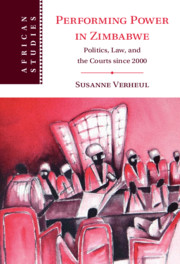Book contents
- Performing Power in Zimbabwe
- African Studies Series
- Performing Power in Zimbabwe
- Copyright page
- Dedication
- Contents
- Figures
- Acknowledgements
- Abbreviations
- Introduction
- 1 History, Authority and the Law in Zimbabwe, 1950–2002
- 2 ‘Rebels’ and ‘Good Boys’
- 3 ‘Zimbabweans Are Foolishly Litigious’
- 4 ‘What Is Abnormal Is Normal’
- 5 Material and Sensory Courtrooms
- 6 The Trials of the ‘Traitor’ in Harare’s Magistrates’ Courts under the Unity Government
- 7 History, Consciousness and Citizenship in Matabeleland
- 8 Historical Narrative and Political Strategy in Bulawayo’s Magistrates’ Courts
- Conclusion
- Bibliography
- Index
- African Studies Series
5 - Material and Sensory Courtrooms
Observing the ‘Decline of Professionalism’ in Harare’s Magistrates’ Courts
Published online by Cambridge University Press: 31 August 2021
- Performing Power in Zimbabwe
- African Studies Series
- Performing Power in Zimbabwe
- Copyright page
- Dedication
- Contents
- Figures
- Acknowledgements
- Abbreviations
- Introduction
- 1 History, Authority and the Law in Zimbabwe, 1950–2002
- 2 ‘Rebels’ and ‘Good Boys’
- 3 ‘Zimbabweans Are Foolishly Litigious’
- 4 ‘What Is Abnormal Is Normal’
- 5 Material and Sensory Courtrooms
- 6 The Trials of the ‘Traitor’ in Harare’s Magistrates’ Courts under the Unity Government
- 7 History, Consciousness and Citizenship in Matabeleland
- 8 Historical Narrative and Political Strategy in Bulawayo’s Magistrates’ Courts
- Conclusion
- Bibliography
- Index
- African Studies Series
Summary
Chapter 5 focuses on the material and sensory conditions of Harare’s Magistrates’ Courts at Rotten Row. It specifically examines how human rights lawyers and their clients incorporated the material and sensory conditions in these courts into their courtroom performances, which drew attention to the shortcomings of the courts as spaces in which to the display state authority. While the Magistrates’ Courts were full of spatial and symbolic trademarks that aimed to highlight the power of the law, the political and economic situation in Zimbabwe after 2000 had severely damaged the courts’ material condition. The real and symbolic effects of this material decline undermined law’s authority. For human rights lawyers, these conditions were further indicative of the government’s preoccupation with law’s coercive rather than legitimating utility. Through visual, olfactory and auditory reminders of the horrific conditions in police detention, ZANU-PF demonstrated its control over activists' and lawyers' bodies and minds. Lawyers and their clients, however, also used these sensory dimensions to contest the state's authority. By calling attention to their dirty, damaged and smelly bodies in the dock, lawyers and defendants aimed to expose the decline in moral and professional conduct they observed within Zimbabwe’s judicial and police services.
Keywords
- Type
- Chapter
- Information
- Performing Power in ZimbabwePolitics, Law, and the Courts since 2000, pp. 123 - 152Publisher: Cambridge University PressPrint publication year: 2021



